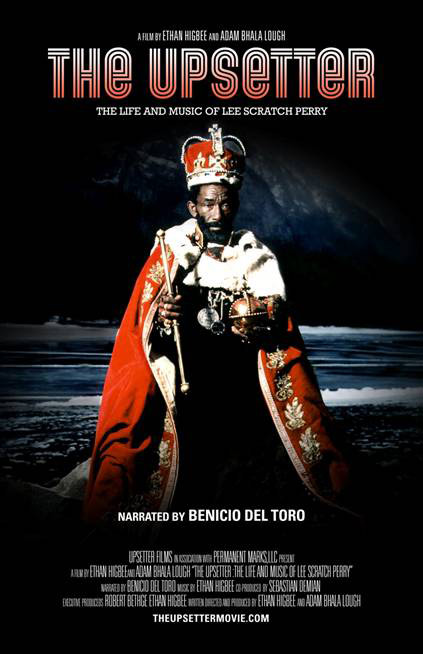
The Life & Music of Lee “Scratch” Perry
by Stephen Slaybaugh
There’s probably a fine line between genius and madness, and it’s one that Lee “Scratch” Perry has crossed back and forth over multiple times during his 75 years. The legendary producer and musician is directly responsible for the creation of reggae and dub, and hence indirectly fathered resultant genres like hip-hop, trip-hop and drum ’n’ bass. He produced important sides for Bob Marley and the Wailers, Junior Marvin, and the Congos, and he’s worked with artists as wide-ranging as Linda McCartney, the Clash and the Beastie Boys. He also burned his Black Ark studio, which he built by hand himself, to the ground after becoming convinced that it was possessed by evil spirits following a particularly heavily drug-fueled recording session.
The Upsetter: The Life & Music of Lee “Scratch” Perry, a new documentary directed by Ethan Higbee and Adam Bhala Lough, attempts to capture the wild, duplicitous nature of this musical pioneer. Combining home video footage with newly filmed interviews with Perry, the film is autobiographical in nature, with Perry telling much of his own story in a unique mix of colorful language and scattered reasoning. Fortunately, the blanks are filled in with voiceovers from Benicio Del Toro.
Between the archival footage, usage of Perry’s music and Scratch’s narrative, the peaks of the Upsetter’s career are told in detail. The segments of Perry at work in the Black Ark are the most revealing, showing the mad genius creating in his environment. Elsewhere, however, the film looses focus, getting bogged down on certain details with some scenes running far too long (an entire song being recorded, all of the Guinness commercial Perry was in). Moreover, Perry’s work in the ’90s is mostly skipped over save for a mention of the song he recorded with the Beastie Boys (“Dr. Lee, PhD”). Perry made multiple records with Mad Professor during the decade and it seems particularly odd that these collaborations, which resuscitated his career, aren’t examined.
Indeed, The Upsetter’s greatest flaw is that it presents just as many questions as it answers. More than a comprehensive biography, the film is an impressionistic snapshot of this musical legend. That’s not to say that the movie isn’t worth seeing or that it’s not entertaining— it is and it is. It’s just hard to tell why such gaps were left unfilled, so while The Upsetter reveals something of Perry, ultimately we are left just as confused as enlightened.
Pere Ubu Live Review
Edwyn Collins Live Review
Lemmy: 49% Motherf**ker, 51% Son of a Bitch
Paul Collins Beat Live Review
The Church Live Review
Tusk 33⅓
The Dismemberment Plan Live Review
Complaints Choir
Gruff Rhys Live Review
Todd P Goes to Austin
Guided By Voices Live Review
Hüsker Dü: The Story of the Noise-Pop Pioneers Who Launched Modern Rock
Bob Marley and the Golden Age of Reggae 1975-1976
A Dead Boy's Tale from the Front Lines of Punk Rock
